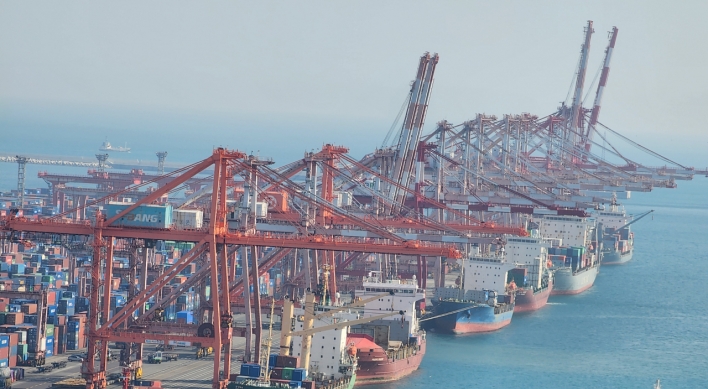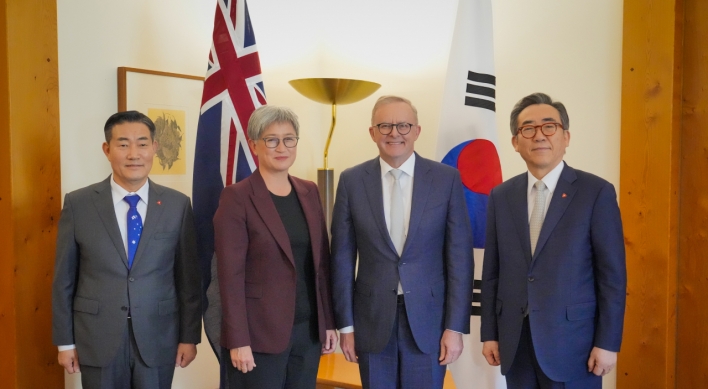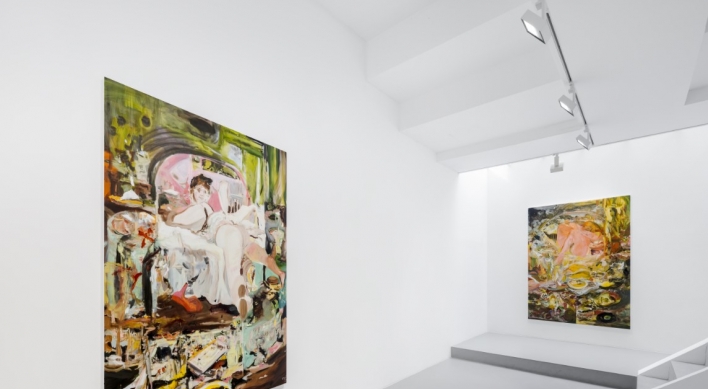BAMAKO (AP) ― Several thousand people took to the streets of Mali’s capital in support of last week’s coup and to protest against the possible use of force by Mali’s neighbors who are putting a peacekeeping unit on standby in case the country’s military junta refuses to stand down.
The coup has been divisive in Mali because many were fed up with President Amadou Toumani Toure’s failure to contain a rebellion by Tuareg fighters in the nation’s north. The wives and mothers of soldiers killed in the bungled operations have not been able to retrieve the bodies of their husbands and sons. And Toure’s government has attempted to cover-up the extent of the losses in an effort to contain the anger.
Many here say they do not want Toure, known by his initials ATT, to come back. At the same time, the coup has erased Mali’s reputation as an established democracy, reversing over 20 years of democratic gains and has been condemned by foreign governments.
The regional body representing nations in West Africa is sending a delegation of four African leaders to Mali on Thursday to negotiate with coup leader, Capt. Amadou Haya Sanogo. The Economic Community of West African States, or ECOWAS, has warned that Mali must immediately restore constitutional order.
The bloc announced after an emergency meeting on Tuesday that they are putting a peacekeeping force on standby, suggesting they may consider using force if Sanogo refuses to step aside. The difficulty is that the junta leader has its supporters, which will make negotiations for his departure more difficult.
“It’s the first time I’m really proud of Mali and of Africa,” said Niamoye Toure, a young doctor, among the thousands who had come Wednesday to occupy a downtown boulevard in a show of support for the coup. “Honestly I’d given up on Mali. It’s only now with the military that I’ve regained some hope. Capt. Sanogo isn’t here to hold onto power, but just to bring some order.”
Late on Tuesday on the evening newscast, the junta read out the 69 articles of the new constitution, with each successive section spelling out the various powers of the military council now ruling the country of 15.4 million. The new law includes many of the same guarantees as the previous constitution, like the right of free speech. But it also explains that the head of the military committee will now be the president of the country. He will appoint a prime minister.
The committee will be comprised of 26 members of the security force and 15 civilians. The committee will rule for a transitional period, before organizing legislative and presidential elections. Article 66 says that those that serve on the committee will not be eligible to run in the elections. However, Articles 67 and 68 lay out how the constitution can be amended in order to change these and other provisions.
Alassane Ouattara, the president of Ivory Coast who holds the rotating chair of ECOWAS, told reporters after an emergency meeting in the capital of his nation ― that itself was shot up and bloodied in a political crisis last year _ that Mali’s democracy cannot be abandoned.
“We cannot allow this country endowed with such precious democratic instruments, dating back at least two decades, to leave history by regressing. It’s why Mali needs to immediately return its democratic institutions to normal,” said Ouattara. “This position is nonnegotiable.”
Already, the United States, the European Union and France have cut off all but essential aid, a loss of tens of millions of dollars. Additional sanctions from the region would be a further blow to the junta, which seized control of the landlocked nation in the wake of a mutiny at a military camp in the capital one week ago.
In the chaos that ensued, soldiers stormed the presidential palace. The whereabouts of President Toure, who was due to step down after elections next month.
In his first public comments, Toure on Thursday told French radio RFI that he was still in Mali and was in good health though he said he is not able to do as much exercise as he would like, suggesting he is confined to a limited space. He said, however, that he is free and is not being held by the junta.
Asked if he expected to be reinstated as president, Toure said: “The most important thing for me is not me. I was two months away from finishing my term. I think the most important thing today is that we should, through consensus,” he said, “find a way out of this crisis. The most important thing is not ATT, not the man. What is important is democracy, our institutions, Mali.”
He declined to say whether he though the new constitution was valid. He also declined to say whether he still considers himself president, and whether or not he agrees with the possible use of force by ECOWAS to oust the junta.
The coup has been divisive in Mali because many were fed up with President Amadou Toumani Toure’s failure to contain a rebellion by Tuareg fighters in the nation’s north. The wives and mothers of soldiers killed in the bungled operations have not been able to retrieve the bodies of their husbands and sons. And Toure’s government has attempted to cover-up the extent of the losses in an effort to contain the anger.
Many here say they do not want Toure, known by his initials ATT, to come back. At the same time, the coup has erased Mali’s reputation as an established democracy, reversing over 20 years of democratic gains and has been condemned by foreign governments.
The regional body representing nations in West Africa is sending a delegation of four African leaders to Mali on Thursday to negotiate with coup leader, Capt. Amadou Haya Sanogo. The Economic Community of West African States, or ECOWAS, has warned that Mali must immediately restore constitutional order.
The bloc announced after an emergency meeting on Tuesday that they are putting a peacekeeping force on standby, suggesting they may consider using force if Sanogo refuses to step aside. The difficulty is that the junta leader has its supporters, which will make negotiations for his departure more difficult.
“It’s the first time I’m really proud of Mali and of Africa,” said Niamoye Toure, a young doctor, among the thousands who had come Wednesday to occupy a downtown boulevard in a show of support for the coup. “Honestly I’d given up on Mali. It’s only now with the military that I’ve regained some hope. Capt. Sanogo isn’t here to hold onto power, but just to bring some order.”
Late on Tuesday on the evening newscast, the junta read out the 69 articles of the new constitution, with each successive section spelling out the various powers of the military council now ruling the country of 15.4 million. The new law includes many of the same guarantees as the previous constitution, like the right of free speech. But it also explains that the head of the military committee will now be the president of the country. He will appoint a prime minister.
The committee will be comprised of 26 members of the security force and 15 civilians. The committee will rule for a transitional period, before organizing legislative and presidential elections. Article 66 says that those that serve on the committee will not be eligible to run in the elections. However, Articles 67 and 68 lay out how the constitution can be amended in order to change these and other provisions.
Alassane Ouattara, the president of Ivory Coast who holds the rotating chair of ECOWAS, told reporters after an emergency meeting in the capital of his nation ― that itself was shot up and bloodied in a political crisis last year _ that Mali’s democracy cannot be abandoned.
“We cannot allow this country endowed with such precious democratic instruments, dating back at least two decades, to leave history by regressing. It’s why Mali needs to immediately return its democratic institutions to normal,” said Ouattara. “This position is nonnegotiable.”
Already, the United States, the European Union and France have cut off all but essential aid, a loss of tens of millions of dollars. Additional sanctions from the region would be a further blow to the junta, which seized control of the landlocked nation in the wake of a mutiny at a military camp in the capital one week ago.
In the chaos that ensued, soldiers stormed the presidential palace. The whereabouts of President Toure, who was due to step down after elections next month.
In his first public comments, Toure on Thursday told French radio RFI that he was still in Mali and was in good health though he said he is not able to do as much exercise as he would like, suggesting he is confined to a limited space. He said, however, that he is free and is not being held by the junta.
Asked if he expected to be reinstated as president, Toure said: “The most important thing for me is not me. I was two months away from finishing my term. I think the most important thing today is that we should, through consensus,” he said, “find a way out of this crisis. The most important thing is not ATT, not the man. What is important is democracy, our institutions, Mali.”
He declined to say whether he though the new constitution was valid. He also declined to say whether he still considers himself president, and whether or not he agrees with the possible use of force by ECOWAS to oust the junta.
-
Articles by Korea Herald





![[Herald Interview] Mom’s Touch seeks to replicate success in Japan](http://res.heraldm.com/phpwas/restmb_idxmake.php?idx=644&simg=/content/image/2024/04/29/20240429050568_0.jpg&u=)




![[News Focus] Lee tells Yoon that he has governed without political dialogue](http://res.heraldm.com/phpwas/restmb_idxmake.php?idx=644&simg=/content/image/2024/04/29/20240429050696_0.jpg&u=20240429210658)








![[Today’s K-pop] Seventeen sets sales record with best-of album](http://res.heraldm.com/phpwas/restmb_idxmake.php?idx=642&simg=/content/image/2024/04/30/20240430050818_0.jpg&u=)